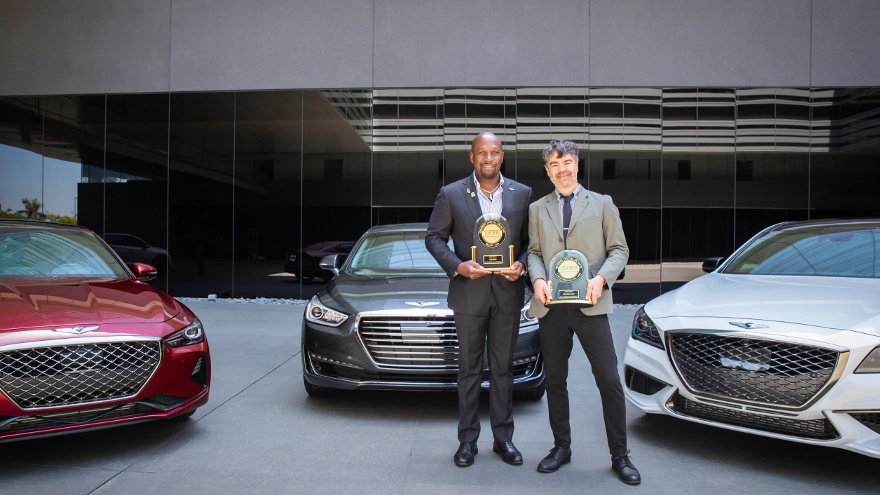Genesis, Kia, Hyundai lead latest J.D. Power initial quality ratings

Genesis Motor America executive director and general manager Erwin Raphael (left) and Geoffrey Mortimer-Lamb, vice president, head of global product development at J.D. Power. Photo courtesy of automaker.
By subscribing, you agree to receive communications from Auto Remarketing and our partners in accordance with our Privacy Policy. We may share your information with select partners and sponsors who may contact you about their products and services. You may unsubscribe at any time.
COSTA MESA, Calif. –
This year, not only has new-vehicle quality improved for the fourth straight year, it has also reached its best level to date, according to the J.D. Power U.S. Initial Quality Study.
After taking a look at the number of problems experienced per 100 vehicles (PP100) across the first 90 days of ownership, the company found that new-vehicle quality has improved 4 percent from last year.
With a score of 68 PP100, Genesis is the highest ranking brand this year, followed by Kia and Hyundai which have scorers of 72 PP100 and 74 PP100, respectively.
While this is the fourth consecutive year that Kia leads as the top ranking mass-market brand, it is the first time that Korean brands have exclusively held the top three spots.
Meanwhile, with a total of five awards received this year, Ford Motor Co. is the brand to take home the most model-level awards.
Along with Ford’s Expedition, Mustang, and Super Duty models, when it comes to quality, both the American manufacturer’s Lincoln Continental and MKC models rank the highest in their respective segments this year.
Subscribe to Auto Remarketing to stay informed and stay ahead.
By subscribing, you agree to receive communications from Auto Remarketing and our partners in accordance with our Privacy Policy. We may share your information with select partners and sponsors who may contact you about their products and services. You may unsubscribe at any time.
Furthermore, 21 of the 31 brands included in the study show an improvement boost across most categories measured by J.D. Power.
In regards to areas where new vehicles show the most improvement, the study found that vehicle exterior has seen the most improvement among eight different categories.
In contrast to 16.6 PP100 in 2017, vehicle exterior is now at 15.2 PP100 and vehicle seats are 8.0 PP100 versus 8.7 PP100 and vehicle interior is 14.3 PP100 versus 14.7 PP100, with respect to other notable year-over-year improvements.
“There’s no question that most automakers are doing a great job of listening to consumers and are producing vehicle quality of the highest caliber,” J.D. Power vice president of global automotive Dave Sargent said in a new release. “That said, some vehicle owners are still finding problems.”
He went on to explain that “As vehicles become more complex and automated, it is critical that consumers have complete confidence in automakers’ ability to deliver fault-free vehicles.”
Apart from trends that have contributed to consistent new-vehicle quality growth, unlike decreasing infotainment problems in vehicles, driver assistance system difficulty is rising.
Despite a considerably low PP100 of 3.5 among all models, driver assistance system problems have been increasing an estimated 20-percent annually for about three years, according to J.D. Power.
“As we look to the future, avoiding problems with safety and driver assistance technology is critical,” Sargent added. “In an era of increasingly automated vehicles, vehicle owners have to be comfortable using foundational technologies like lane keep assistance and collision avoidance. Otherwise, automakers will not easily overcome consumer resistance to fully automated (driverless) cars.”
From February through May, J.D. Power said that it surveyed a total 75,712 new 2018 model-year vehicle drivers for the study.
The complete 2018 study can be found here.


